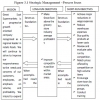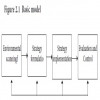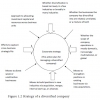Strategic Management - Concept Of Corporate Strategy
Strategic management in India - Strategic Management Process
Posted On :
After the economic liberalization announced in India in 1991, strategic management has gained greater relevance.
Strategic
management in India
After the economic liberalization announced in India in 1991, strategic management has gained greater relevance. In fact it is a major thrust area after the WTO meet of December 2005 held in Hong Kong. Figure 2.3 lists the environmental changes that have increased the rele-vance of strategic management. In view of this to make strategic manage-ment effective organizations are showing some new initiatives described here.
2. The delicensing has removed not only an important entry and growth
barrier but also a consumption (and, therefore, demand) barrier. In the past,
because of non-production/limited production and import restrictions, many
goods were non-available or had limited availability (in quantity and /or
variety).
3. The scrapping of most of the MRTP Act restrictions on entry, growth and Mergers &Acquisitions (M&As) , along with the dereservation and delicensing of industries referred to above, have opened up flood-gates of business opportunities for large enterprises.
4. The liberalization in policy towards foreign capital and technology,
imports and accessing foreign capital markets provides companies opportunities
for enhancing their strengths to exploit the opportunities.
5. The liberalization in other countries, the expanding foreign markets, the growing competition in India, the new policy environment etc., increase the importance of foreign markets and strategic management.
6. The grant of more autonomy to the public sector enterprises, as in the case of the navarathnas, increases the scope of strategic management.
Source: Cherunilam, Francis( 2002) Strategic Management,
Himalaya Publishing Company, New Delhi
Strategic flexibility demands a long-term commitment to the development and nurturing of critical resources. It also demands that the company become a learning organization – an organization skilled at creating, acquiring, and transferring knowledge, and at modifying its behavior to reflect new knowledge and insights. Organizational learning is a critical component of competitiveness in a dynamic environment. It is particularly important to innovation and new product development.
For example, Hewlett-Packard uses an extensive network of informal committees to transfer knowledge among its cross-functional teams and to help spread new sources of knowledge quickly.
The very purpose of strategic management is to win over its competitors. Total quality Management (TQM) is an organizational philosophy that aims at maximizing customer satisfaction by constantly striving to enhance operational efficiency through out the organization. It is a start to finish process that systematically integrates the strategy and all the function activities of the organization. Most of the Japanese companies adopted TQM practices in 1970 itself.
TQM method measures customers’ needs, measures and evaluate customer satisfaction delivered by the product or service ,and engages the organization in continuous improvement to stay tuned-in to changes in customers’ needs”.
The essential characteristics of
TQM are:
A customer-driven definition of quality
Strong quality leadership
Emphasis on continuous improvement
Reliance on facts, data, and analysis
Encouragement of employee participation
It is imperative for a company, which has adopted the TQM to integrate it with every phase of the strategic management.
The environmental analysis of a company with TQM connects the needs of the external customer (the entirety that buys the good or service of the company) with the various activities of the company.
TQM influences the organizational direction by embodying the quality philosophy in the organizational mission. Indeed, the missions of a number of organizations emphasize that quality and continuous improvement must drive every action of the organization.
TQM helps make strategy implementation very efficient because of the clarity of organizational goals and direction, and the work and relationships culture fostered by TQM.
Systems established under TQM and the favorable change in the organizational culture make strategic control more effective. Benchmarking also helps efficient control.
Information technology adaptation
Until the mid 1989 business firms were successfully making profits without using Internet or launching their websites. Today virtual shopping and online retailing supplement brick and mortar sales. A great success is that of amazon.com, which do not involve in brick and mortar retailing at all. All their sales come from online business only today.
Space providers like e-bay.com are becoming increasingly popular in India after taking over bazee.com. Executives today are electronic executives who cannot operate without World Wide Web.
Nike and Reebok, for example, manufacture their athletic shoes in various countries thorough out Asia for sale on every continent. Instead of using one international division to manage everything outside the home country, large corporations are now using matrix structures in which product units are interowen with country or regional units. International assignments are now considered key for anyone interested in reaching top management.
After the economic liberalization announced in India in 1991, strategic management has gained greater relevance. In fact it is a major thrust area after the WTO meet of December 2005 held in Hong Kong. Figure 2.3 lists the environmental changes that have increased the rele-vance of strategic management. In view of this to make strategic manage-ment effective organizations are showing some new initiatives described here.
1. The abolition of public sector monopoly or dominance in a number of industries has enormously increased business opportunities. Many of them are high-tech and heavy investment sectors which make strategic management all the more relevant.
3. The scrapping of most of the MRTP Act restrictions on entry, growth and Mergers &Acquisitions (M&As) , along with the dereservation and delicensing of industries referred to above, have opened up flood-gates of business opportunities for large enterprises.
5. The liberalization in other countries, the expanding foreign markets, the growing competition in India, the new policy environment etc., increase the importance of foreign markets and strategic management.
6. The grant of more autonomy to the public sector enterprises, as in the case of the navarathnas, increases the scope of strategic management.
Trend Setters in Indian Economy
Source: Cherunilam, Francis( 2002) Strategic Management,
Himalaya Publishing Company, New Delhi
(i) Developing learning organization
Strategic flexibility demands a long-term commitment to the development and nurturing of critical resources. It also demands that the company become a learning organization – an organization skilled at creating, acquiring, and transferring knowledge, and at modifying its behavior to reflect new knowledge and insights. Organizational learning is a critical component of competitiveness in a dynamic environment. It is particularly important to innovation and new product development.
For example, Hewlett-Packard uses an extensive network of informal committees to transfer knowledge among its cross-functional teams and to help spread new sources of knowledge quickly.
(ii) TQM Implementation
The very purpose of strategic management is to win over its competitors. Total quality Management (TQM) is an organizational philosophy that aims at maximizing customer satisfaction by constantly striving to enhance operational efficiency through out the organization. It is a start to finish process that systematically integrates the strategy and all the function activities of the organization. Most of the Japanese companies adopted TQM practices in 1970 itself.
TQM method measures customers’ needs, measures and evaluate customer satisfaction delivered by the product or service ,and engages the organization in continuous improvement to stay tuned-in to changes in customers’ needs”.
A customer-driven definition of quality
Strong quality leadership
Emphasis on continuous improvement
Reliance on facts, data, and analysis
Encouragement of employee participation
It is imperative for a company, which has adopted the TQM to integrate it with every phase of the strategic management.
Environmental Analysis and TQM
The environmental analysis of a company with TQM connects the needs of the external customer (the entirety that buys the good or service of the company) with the various activities of the company.
Organizational Decision and TQM
TQM influences the organizational direction by embodying the quality philosophy in the organizational mission. Indeed, the missions of a number of organizations emphasize that quality and continuous improvement must drive every action of the organization.
Strategy Formulation and TQM
TQM helps make strategy implementation very efficient because of the clarity of organizational goals and direction, and the work and relationships culture fostered by TQM.
Strategic Control and TQM
Systems established under TQM and the favorable change in the organizational culture make strategic control more effective. Benchmarking also helps efficient control.
Information technology adaptation
Until the mid 1989 business firms were successfully making profits without using Internet or launching their websites. Today virtual shopping and online retailing supplement brick and mortar sales. A great success is that of amazon.com, which do not involve in brick and mortar retailing at all. All their sales come from online business only today.
Space providers like e-bay.com are becoming increasingly popular in India after taking over bazee.com. Executives today are electronic executives who cannot operate without World Wide Web.
Globalizing Operations
Nike and Reebok, for example, manufacture their athletic shoes in various countries thorough out Asia for sale on every continent. Instead of using one international division to manage everything outside the home country, large corporations are now using matrix structures in which product units are interowen with country or regional units. International assignments are now considered key for anyone interested in reaching top management.
As more industries become global,
strategic management is becoming an increasingly important way to keep track of
international developments and position the company for long-term competitive
advantage.
Tags : Strategic Management - Concept Of Corporate Strategy
Last 30 days 4676 views















